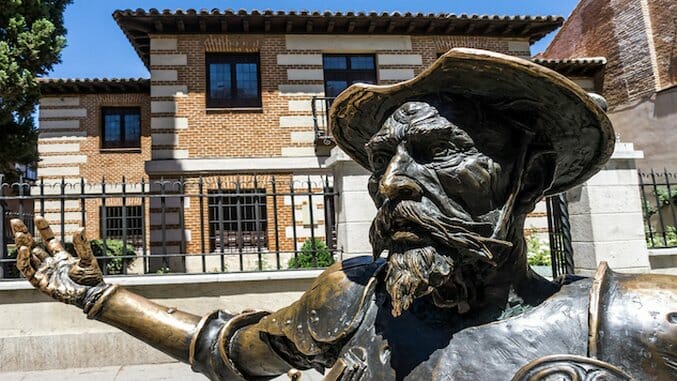6 Reasons Madrid Is a Great Place For Writers

European cities with their cobblestone streets, cozy cafes, and rich history of arts have been attracting writers from around the world for years. Which one of us with a gravitation toward a pen and notebook (or laptop, let’s be real) hasn’t dreamed of penning our debut novel while sipping coffee—or something a bit stronger—in Paris, London, or Rome? While those three definitely have their appeal, they are not the only cities on the European map to park your typewriter (because you’re more likely to be a hipster and use a bulky typewriter than a pen and paper).
The capital of Spain since the latter part of the 16th century, Madrid can offer an aspiring writer both the atmosphere to create the next best-seller and the chance to enjoy life while at it—all at a very reasonable cost. With its almost-year around sunshine, good food and wine, and a propensity for la buena vida, the good life, Madrid is known throughout Europe for its beauty, friendliness to strangers, and passion. Its architecture runs the gamut from medieval mansions to baroque to belle époque; its restaurants serve both innovative and traditional takes on Spanish cuisine from all over the Iberian peninsula; and its nightlife is full of locals and visitors alike, all happy to partake in what seems like a nonstop party. Put simply, Madrid invokes creativity, but if you need any more convincing, read on.
1. Cheap Liquid Courage
 Photo by Rebecca Strong
Photo by Rebecca Strong
If you need a hot beverage as you type, a cup of coffee (or tea) in Madrid will not cause you to default on your student loans. Café con leche, latte’s humble cousin, goes for 1.30 euros-2 euros per cup and sometimes even comes with a piece of chocolate or a ginger cookie. Since a table at a cafe is usually yours for as long as you want, writing is the only reasonable thing to do. Unless, of course, you like to procrastinate by watching the locals in their natural habitat. In that case you can always file it under “character research.”
If your beverage of choice isn’t coffee and you prefer to test Spain’s wide assortment of vintages, fear not. A glass of wine in Madrid could cost you less than or the same as a bottle of mineral water. Plus it’ll always arrive accompanied by algo para picar, something to snack on. In some places it’ll be a full-fledged tapa, in others a bowl of olives or potato chips. Either way, it’ll be yours to enjoy absolutely free. The same goes for beer; a caña, a small glass of draft beer, will cost about the same as café con leche and will include a bite of food.
2. Cultural Inspiration
Madrid is full of inspirational art. Many of its major museums—Museo Nacional del Prado and Museo Nacional Centro de Arte Reina Sofia among them—offer free entry during portions of the day. Set usually between the hours of 6 and 9 p.m., they fall right after your siesta and before your evening out. If large museums are too overwhelming to get your creative juices flowing, you’ll be better suited at Museo Sorolla and Museo Lázaro Galliano. In addition to beautiful collections of art and historical artifacts, they feature gardens where you could write outside should an idea suddenly come to you by way of painting. For a museum with a more literary focus, forget Hemingway and head to the Cervantes Museo Casa Natal (pictured at top), the museum at the birthplace of Miguel de Cervantes Saavedra, who wrote Don Quixote. Talk about inspiration; maybe take a seat and try to channel some of his energy … you never know when creativity will strike.
3. Outdoor Options
 Photo by Rachel Williams
Photo by Rachel Williams  Photo by Central Press / Stringer
Photo by Central Press / Stringer